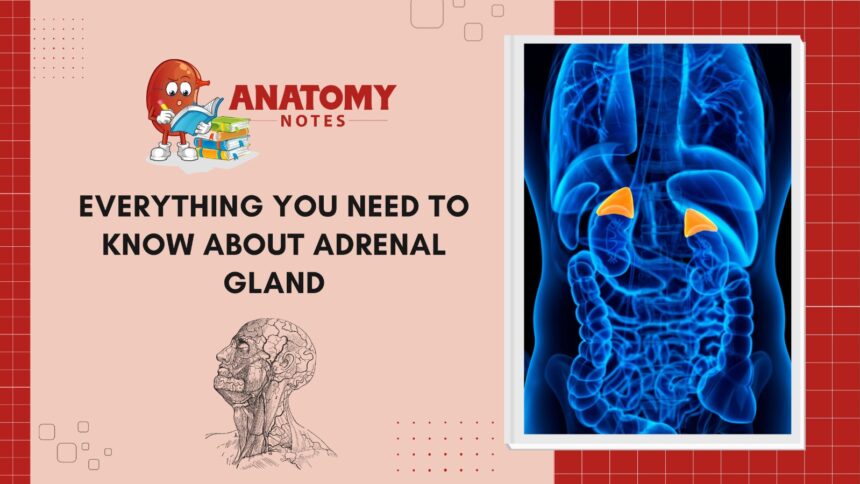Introduction to the Adrenal Gland
Welcome to the fascinating world of the adrenal gland – a small but mighty organ that plays a significant role in your body’s daily functions. Have you ever wondered about the powerhouse behind your stress response or where those essential hormones come from? Join us on an enlightening journey as we delve into everything you need to know about this underrated yet crucial part of your endocrine system. Let’s uncover the secrets of the adrenal gland together!
Anatomy of the Adrenal Gland
Nestled atop your kidneys like tiny powerhouses, the adrenal glands play a crucial role in your body’s functioning. Let’s delve into their anatomy to uncover their secrets.
The adrenal glands consist of two main parts: the outer layer called the adrenal cortex and the inner part known as the adrenal medulla. Each part has distinct functions that contribute to your overall well-being.
The adrenal cortex is responsible for producing essential hormones such as cortisol, aldosterone, and sex hormones. These hormones regulate metabolism, blood pressure, and reproductive functions.
On the other hand, the adrenal medulla releases adrenaline (epinephrine) and noradrenaline (norepinephrine) in response to stress or danger. These “fight or flight” hormones prepare your body for action when facing a threat.
Understanding the intricate anatomy of the adrenal gland sheds light on its vital role in maintaining balance within your body.
Location and Structure
Nestled atop your kidneys like two tiny hats are the adrenal glands, each no bigger than a grape. These unassuming powerhouses play a vital role in your body’s daily functions. The location of the adrenal glands is key – situated just above the kidneys, they have a front-row seat to your body’s needs.
Structurally speaking, these glands are divided into two parts: the outer layer known as the adrenal cortex and the inner region called the adrenal medulla. It’s like having a dual-functioning superhero right inside you! The cortex handles essential tasks like regulating metabolism and blood pressure, while the medulla jumps into action during times of stress by releasing adrenaline.
So next time you feel that surge of energy or heightened alertness in response to stress, thank your trusty adrenal glands for kicking into gear. They may be small, but their impact on your wellbeing is mighty.
The Adrenal Cortex
The adrenal cortex is the outer layer of the adrenal gland, responsible for producing essential hormones that regulate various bodily functions. It can be further divided into three zones: the zona glomerulosa, which produces mineralocorticoids like aldosterone; the zona fasciculata, which synthesizes glucocorticoids such as cortisol; and the zona reticularis, responsible for androgen production.
Each zone plays a crucial role in maintaining homeostasis within the body. For instance, aldosterone helps regulate blood pressure by controlling sodium and potassium levels, while cortisol plays a key role in metabolism and immune response regulation. Androgens produced by the adrenal cortex contribute to secondary sexual characteristics.
The adrenal cortex is vital for overall health and well-being due to its involvement in hormone production that impacts nearly every system in our bodies.
The Adrenal Medulla
Nestled in the core of the adrenal gland lies a vital component known as the Adrenal Medulla. This inner region plays a crucial role in our body’s response to stress and emergencies. It is primarily responsible for producing hormones like adrenaline and noradrenaline, which are key players in the fight-or-flight response.
When faced with a threat or danger, the Adrenal Medulla swiftly releases these hormones into the bloodstream, triggering a cascade of physiological changes. These changes include increased heart rate, heightened alertness, and enhanced muscle strength – all geared towards preparing your body to either confront or flee from potential harm.
Unlike the outer layer of the adrenal gland (the Adrenal Cortex), which produces different types of hormones essential for everyday bodily functions, the Adrenal Medulla specializes in rapid responses to acute stressors. Its swift actions allow us to adapt quickly to challenging situations and protect ourselves when needed most.
Hormones Produced by the Adrenal Gland
The adrenal gland is a powerhouse when it comes to hormone production. Situated on top of each kidney, this small but mighty organ plays a crucial role in regulating various bodily functions through the hormones it secretes.
One of the key hormones produced by the adrenal gland is cortisol, often referred to as the stress hormone. Cortisol helps control blood sugar levels, regulate metabolism, reduce inflammation, and assist with memory formulation.
Another important hormone released by the adrenal glands is aldosterone. This hormone helps regulate blood pressure by controlling electrolyte balance in the body. It specifically targets sodium and potassium levels to maintain proper fluid balance.
Furthermore, adrenaline and noradrenaline are also secreted by the adrenal medulla during times of stress or danger. These hormones trigger the body’s fight-or-flight response, increasing heart rate and boosting energy supplies for immediate action.
In addition to these primary hormones, the adrenal glands produce other essential substances such as DHEA (dehydroepiandrosterone) which contributes to overall hormonal balance in both men and women.
Understanding how these different hormones work together highlights just how vital the adrenal gland is for maintaining our health and well-being.
Functions of the Adrenal Gland
The adrenal gland plays a crucial role in regulating various bodily functions to maintain overall health. One of its key functions is producing hormones that help control metabolism, immune response, and the body’s stress response. These hormones also influence blood pressure and water balance in the body.
Additionally, the adrenal gland assists in controlling inflammation and helps regulate electrolyte levels to ensure proper functioning of muscles and nerves. It secretes cortisol, which aids in managing stress, reducing inflammation, and maintaining blood sugar levels during fasting or periods of physical exertion.
Moreover, the adrenal gland produces adrenaline (epinephrine) and noradrenaline (norepinephrine), which are responsible for the “fight or flight” response when faced with stressful situations. This quick hormonal response prepares the body to react swiftly to perceived threats or dangers.
The functions of the adrenal gland are diverse and essential for maintaining homeostasis within the body.
The Role of Adrenal Gland in Stress Response
The adrenal gland plays a crucial role in our body’s response to stress. When we encounter a stressful situation, the adrenal glands release hormones like adrenaline and cortisol into the bloodstream. These hormones help us react quickly by increasing heart rate, boosting energy levels, and sharpening focus.
In times of stress, the adrenal glands also work with the brain to regulate our fight-or-flight response. This mechanism prepares us to either confront or flee from perceived threats. It’s like having an internal alarm system that kicks in when we need it most.
Chronic stress can put a strain on the adrenal glands, leading to potential health issues over time. That’s why managing stress is essential for maintaining overall well-being and keeping these vital glands functioning optimally.
Understanding how our bodies respond to stress can empower us to take better care of ourselves and seek balance in our lives. By nurturing our adrenal health through self-care practices like mindfulness, exercise, and adequate rest, we can support our body’s natural resilience against everyday challenges.
Adrenal Gland Disorders
Adrenal Gland Disorders can have a significant impact on overall health and well-being. These disorders may arise due to various factors such as tumors, infections, autoimmune conditions, or genetic predispositions. Symptoms of adrenal gland disorders can vary widely depending on the specific condition but may include fatigue, weight changes, high blood pressure, and mood swings.
Diagnosis of adrenal gland disorders typically involves a combination of physical exams, blood tests, imaging studies like CT scans or MRI scans, and hormone level assessments. Treatment options for adrenal gland disorders also vary based on the underlying cause and severity of the condition. In some cases, medication may be prescribed to regulate hormone levels or manage symptoms.
It is essential for individuals with suspected adrenal gland disorders to work closely with healthcare professionals to develop a personalized treatment plan that addresses their unique needs. Regular monitoring and follow-up care are crucial in managing these conditions effectively and maintaining optimal adrenal health.
Diagnosis of Adrenal Gland Disorders
When it comes to diagnosing adrenal gland disorders, healthcare providers rely on a combination of medical history, physical exams, and diagnostic tests. Symptoms such as fatigue, weight loss or gain, high blood pressure, and mood changes may prompt further investigation into adrenal health.
Blood tests are commonly used to measure hormone levels produced by the adrenal glands. Imaging tests like CT scans or MRIs can provide detailed images of the adrenal glands to help identify any abnormalities or tumors.
In some cases, a stimulation test may be conducted where certain medications are given to assess how the adrenal glands respond. It’s important for healthcare professionals to accurately diagnose adrenal gland disorders in order to determine the appropriate treatment plan for each individual’s specific condition.
Early detection through proper diagnosis is crucial in managing adrenal gland issues effectively and ensuring optimal health outcomes over time.
Treatment and Management of Adrenal Gland Issues
When it comes to dealing with adrenal gland issues, treatment and management are essential for maintaining overall health. The approach can vary depending on the specific condition diagnosed by a healthcare professional.
Treatment options may include medication to regulate hormone levels, lifestyle changes such as stress management techniques and dietary adjustments. In some cases, surgery might be necessary to remove tumors or address other underlying causes of adrenal gland disorders.
Regular check-ups are crucial to monitor progress and adjust treatment plans accordingly. Patients should communicate openly with their healthcare providers about any symptoms or concerns that arise during the course of treatment.
In addition to medical interventions, incorporating holistic practices like mindfulness meditation, yoga, and adequate sleep can also support adrenal health. It’s important to take a comprehensive approach when managing adrenal gland issues for optimal well-being.
Maintaining Adrenal Health
Maintaining adrenal health is crucial for overall well-being. Start by incorporating stress-reducing activities into your daily routine, such as meditation or yoga. A balanced diet rich in fruits, vegetables, and lean proteins can also support your adrenal glands. Make sure to stay hydrated and limit caffeine intake to avoid putting unnecessary strain on these vital glands.
Getting enough quality sleep is essential for adrenal health. Aim for 7-9 hours of restful sleep each night to allow your body time to recharge and repair. Regular exercise can help regulate cortisol levels and support healthy adrenal function.
It’s important to listen to your body and prioritize self-care. Set boundaries at work and home to prevent burnout and excessive stress. Remember that small lifestyle changes can have a big impact on adrenal health in the long run.
By taking proactive steps to care for your adrenals, you can optimize their function and maintain balance in your body’s stress response system.
Conclusion
As we wrap up our journey through the fascinating world of the adrenal gland, it’s clear that this small but mighty organ plays a crucial role in maintaining our overall health and well-being. From its intricate anatomy to the complex web of hormones it produces, the adrenal gland is truly a powerhouse in our bodies.
Understanding the functions and importance of this gland can help us appreciate just how interconnected our body systems are. Whether it’s responding to stress or regulating metabolism, the adrenal gland is always working behind the scenes to keep us functioning at our best.
So next time you feel stressed or fatigued, remember to give some thought to your hard-working adrenal glands. Taking steps to maintain their health through proper nutrition, exercise, and stress management can go a long way in supporting your overall vitality.
And with that, we conclude our exploration into the remarkable world of the adrenal gland. Stay curious and continue learning about all the wonders that make up our incredible human bodies!
Frequently Asked Questions (FAQs)
Have more questions about the adrenal gland? Here are some commonly asked questions to help you better understand this important organ:
Q1. What is the function of the adrenal gland?
The adrenal gland plays a crucial role in producing hormones that regulate metabolism, immune response, blood pressure, and stress response.
Q2. Where is the adrenal gland located in the body?
The adrenal glands are situated on top of each kidney.
Q3. How can I maintain good adrenal health?
To keep your adrenal glands healthy, focus on managing stress levels, getting adequate sleep, eating a balanced diet rich in nutrients, and staying physically active.
Q4. What are common disorders of the adrenal gland?
Some common disorders include Addison’s disease, Cushing’s syndrome, and pheochromocytoma.
Q5. How are adrenal gland disorders diagnosed?
Diagnosis usually involves blood tests to measure hormone levels, imaging tests like CT scans or MRIs to visualize the glands and any potential tumors or abnormalities.
Remember that understanding your body’s intricate systems like the adrenal gland can empower you to take better care of your overall health and well-being. Stay informed and listen to what your body needs – it will thank you for it!




